Cornbread Nation 2: The United States of Barbecue (Cornbread Nation: Best of Southern Food Writing) (24 page)
Authors: Unknown

"And he looked at me, and he said like he had after the poker game, `Do you
really want to get into the barbecue business?'
"I said, `Yeah:
"So he said it again, `Do you really want to get into the barbecue business?'
"And I said, `Yeah, man, I really want to get into the barbecue business.'
"He said, `Well if you really want to get into the barbecue business I will put
you in the water, but it will be up to you to learn how to swim.'
"And I said to him, very boastfully, `You put me in the water, and don't you
worry about me learning to swim.'
"He said, `Well, you tell Herb that you'll be back and c'mon let's go.' So I
went back to tell Mr. Woodard I didn't have all my funds and that I'd be back
later.
"As we went back to my car Mr. James said, `I don't want to waste my time
with you if you don't really want to do this.'
"I did not fully understand what he was talking about, but I came to see
what he meant was people think they want to cook barbecue this way, but
when they are standing over the hot pits it makes you have a different trend of
thought. If barbecuing is in your heart -cutting the wood, shoveling, turning
the hog-then all that is something you need to have a burning desire for. Although I didn't know all of that at the time, what I did understand him to be
saying was, `If you want to be a true pit master you have to be ready to go the
whole way.' And if I wanted to go the whole way he would teach me.
`At that time we had an old storage shed out back where my Mom keep
crates and stuff. Mr. Kirby said, `What you doing with all this here?' So we
started to clear out the shed, and when we had cleaned everything he got
down on his knees and drew out the pit. Then we got a mason come in and
line the pit with cement blocks, and then we filled it with sand for the 'incubating period."' Eddie was referring to his trick for slow-cooking by lining the
pit with sand, which holds heat remarkably using relatively little fuel and requiring less fuss.
"Then we went around and got two old oil drums. We went to the welding
shop and had them cut those barrels in half. Then Mr. James set the barrels
down into the sand. Once we got the thing completed it was a `real orthodox
work of art!"' Eddie said with a good deal of nostalgic pride.
"After we got the pigs, we left them to soak in salt water and vinegar. This is
one of those steps, prepping the pig, getting him ready, that people don't do
anymore. But a pig is supposed to go through a twelve-hour soaking period of
vinegar and seasonings, which cuts the fresh taste.
"So the very first night we were going to try it out I was all excited. From
what I knew about barbecuing I was thinking we had to prepare to be there all
night. I went home and told my wife I was going to be up all night cooking
pigs. So I made a couple of sandwiches, made me some coffee, took my flashlight. Mr. James was supposed to be there at six o'clock and we were supposed
to put on the pig. Well I was there at six o'clock, and no James."
At this point in Eddie's tale Mr. Kirby laughed as if he were recalling a delicious practical joke. Eddie responded with the kind of smile that one reserves
for a favorite uncle or grandparent.
"About seven or eight he comes up. We split some oak and some hickory
and left them to soak in a tub of water. We put two twenty-pound bags of
charcoal in each cooker. When the coals got good and hot, he raked the coals to the side, and then he put the grate on top. He took the pigs and washed
them and then he salted them down the back so that the skin would paunch
up. Then we put the pigs on and shut the drafts.
"Next thing I knew Mr. James reached over and grabbed his jacket and
slung it over his shoulder. He put his hat on his head and began walking out
the door, and he leaves me sitting there. I said, `Where you going? You gonna
leave me here?'
"He said, `Oh hell, you can sit there and watch the pig if you want to, but
I'm going home and going to bed.'
"Having no knowledge of the old school, I thought we had to sit there all
night and tend the pig. Anyway I couldn't wait til morning. I was like a kid on
Christmas. I got back about four in the morning, and I took a peek and there
was the prettiest golden brown pig! Mr. James came in about 5:30, and we
flipped the pig and started basting. That, to me, was one of the most memorable times since I started. That was my first experience of the technique called
banking."
At the mention of banking Mr. Kirby and Eddie both shared a mutual
scoundrel's grin, like they had just let me in on a big and funny secret, that secret being that you didn't have to stand watch over a roasting pig like a sentry
in a war zone (or for that matter, like all the other pit masters).
I bit.
"Eddie, what is banking?"
"In this part of the country, we used to have wood heaters or coal heaters.
When I was growing up, we would put coal or wood inside of the heater and
shut off all the drafts. That technique is called banking, in other words, it
shuts the drafts off so the fire won't burn fast, and you have a slow-burning
process all night long which will radiate all over your house (back then we
didn't have central heating). That was a mechanism that the old-timers used
to keep the house warm, but Mr. Kirby, he implemented that particular technique in cooking the pig. Most people say you have to sit out there all night.
Mr. Kirby, as far as I'm concerned, invented this technique." Eddie brought
the story to a close (along about the time that Mr. Kirby appeared to be settling into a light doze). "Every thing I learned I learned from him. This is how
the term pit master came about: 99 percent of the time you find an old black
guy sitting there all night long, nursing a fire (or in Mr. Kirby's case not nursing the fire). However you do it, my thing is if you really want to get back to
the original, somebody needs to preserve that and pass it on."
Mr. Kirby stirred, "Yeah, that's right. That's right."
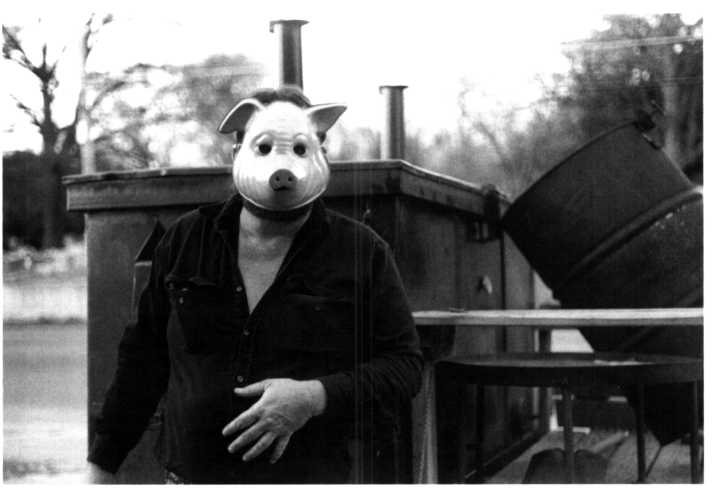
Artrageous Cookers, Jackson, Tennessee
Amy Evans, who heads the Oral History Initiative for the
Southern Foodways Alliance, shot the photographs in this section. To
view more of her work for the SFA, log onto
Originally from Houston, Texas, she received a B.F.A. from the Maryland
Institute College of Art and an M.A. in Southern studies from the University
of Mississippi. Amy is also an exhibiting artist, freelance photographer,
art educator, and cofounder of PieceWorks, a nonprofit community
arts and outreach organization based in Oxford, Mississippi.
(Photographs used by permission of the photographer)
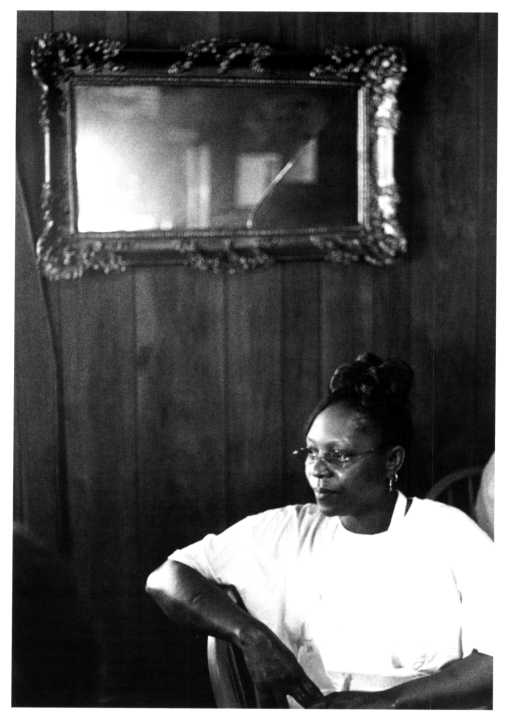
Helen's Bar-B-Q, Brownsville, Texas
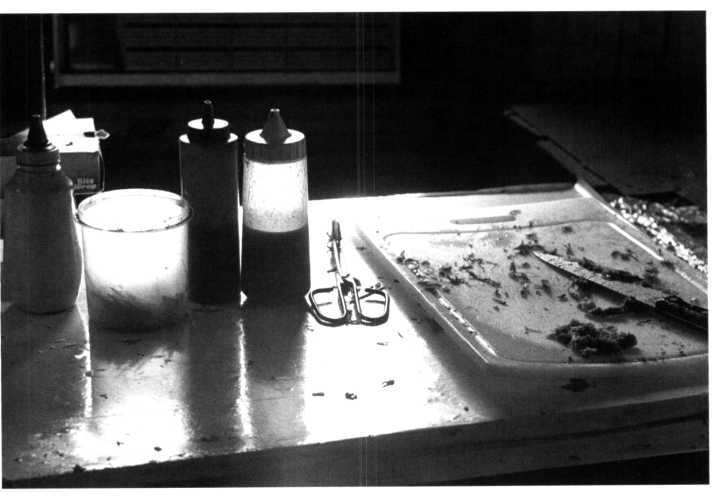
Helen's Bar-B-Q, Brownsville, Texas
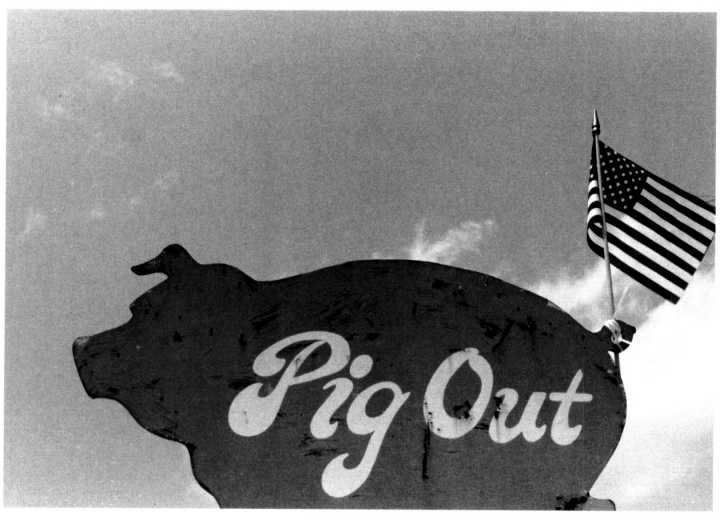
Marlowe's Ribs & Restaurant, Memphis, Tennessee
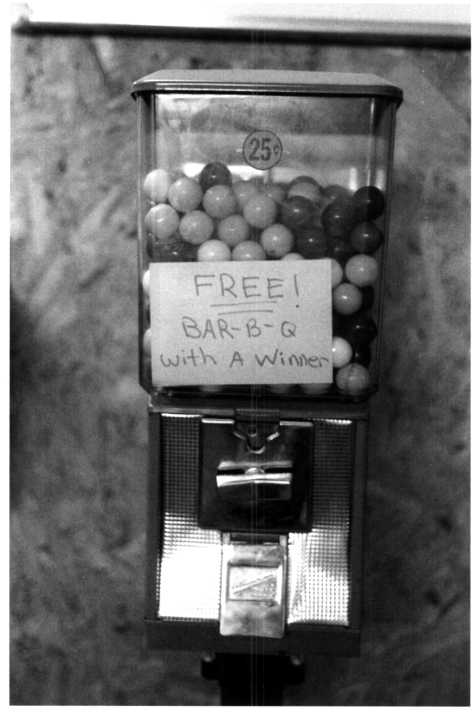
My Three Son's Bar-B-Q, Henderson, Tennessee
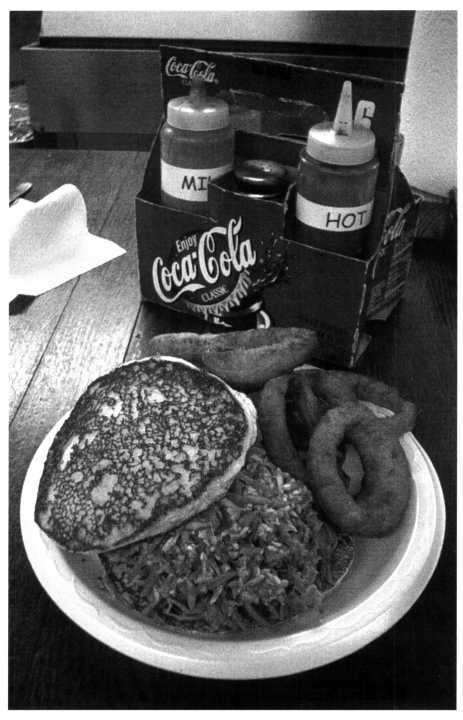
Papa KayJoe's Bar-B-Que, Centerville, Tennessee
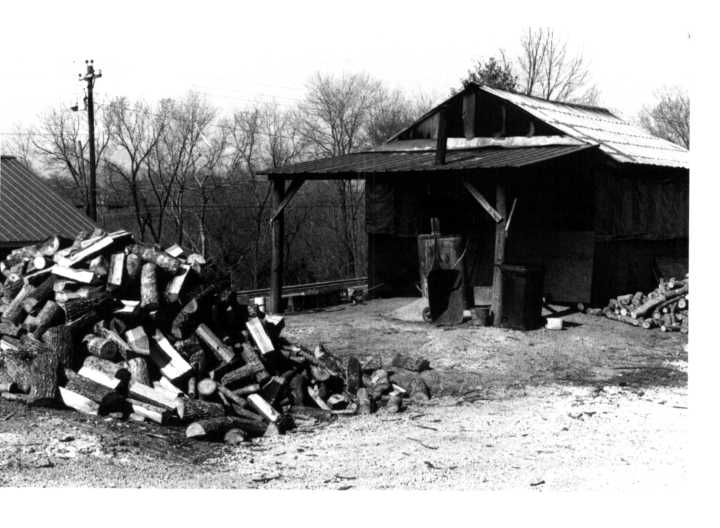
Papa Kay)oe's Bar-B-Que, Centerville, Tennessee
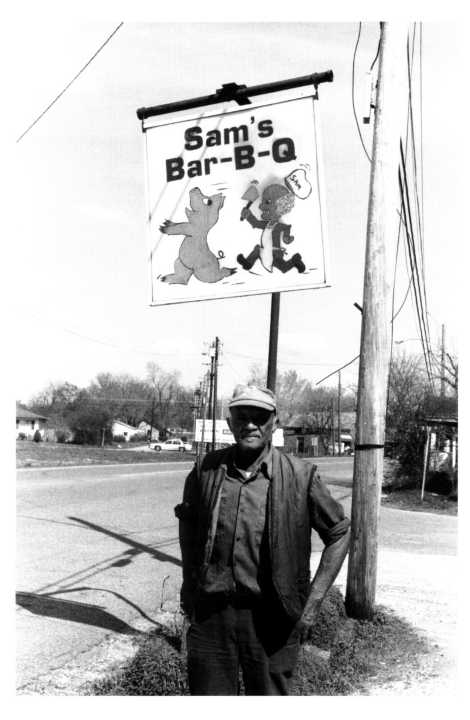
Sam's Bar-B-Q, Humboldt, Tennessee